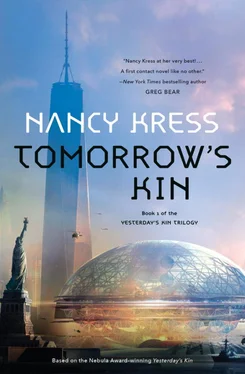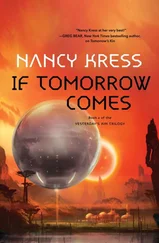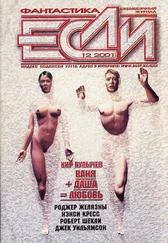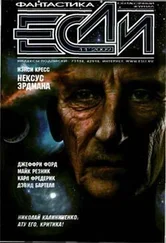Then an outraged voice demanded, “Did those bastards get a city permit for that?”
It broke the silence. Chanting, argument, exclaiming, pushing all resumed. A few motorists gunned their engines, futilely, since it was impossible to move vehicles. The first of the motorcycle cops arrived: NYPD, then Border Patrol, then chaos.
Noah slipped deftly through the mess, back toward the streets north of the Battery. He had to be at work in an hour. The Embassy had nothing to do with him.
* * *
A spore cloud doesn’t look like anything at all.
A darker patch in dark space, or the slightest of veils barely dimming starlight shining behind it. Earth’s astronomers could not accurately say how large it was, or how deep. They relied on Deneb measurements, except for the one fact that mattered most, which human satellites in deep space and human ingenuity at a hundred observatories was able to verify: The cloud was coming. The path of its closest edge would intersect Earth’s path through space at the time the Denebs had said: early September.
Marianne knew that almost immediately following the UN announcement, madness and stupidity raged across the planet. Shelters were dug or sold or built, none of which would be effective. If air could get in, so could spores. In Kentucky, some company began equipping deep caves with air circulation, food for a year, and high-priced sleeping berths: reverting to Paleolithic caveman. She paid no more attention to this entrepreneurial survivalism than to the televised protests, destructive mobs, peaceful marches, or lurid artist depictions of the cloud and its presumed effects. She had a job to do.
On Tuesday she, Evan, and two lab assistants were taken to the submarine bay at UN Special Mission Headquarters. In the sub, Max and Gina huddled in front of the porthole, or maybe it was a portholelike viewscreen, watching underwater fish. Maybe fish were what calmed them. Although they probably didn’t need calming, Marianne, who had worked with both before, had chosen them as much for their even temperaments as for their competence. Government authorities had vetted Max and Gina for, presumably, both crime-free backgrounds and pro-alien attitudes. Max, only twenty-nine, was the computer whiz. Gina, in her midthirties and the despair of her Italian mother because Gina hadn’t yet married, made the fewest errors Marianne had ever seen in sample preparation, amplification, and sequencing.
Evan said to Marianne, “Children all sorted out?”
“Never. Elizabeth won’t leave New York, of course.” ( “Leave? Don’t you realize I have a job to do, protecting citizens from your aliens?” Somehow they had become Marianne’s aliens. And Elizabeth still distrusted them.) “Ryan took Connie to her parents’ place in Vermont and he went back to his purple loosestrife in Canada.”
“And Noah?” Evan said gently. He knew all about Noah; why, Marianne wondered yet again, did she confide in this twenty-eight-year-old gay man as if he were her age, and not Noah’s? Never mind; she needed Evan.
She shook her head. Noah had again disappeared.
“He’ll be fine, then, Marianne. He always is.”
“I know.”
“Look, we’re docking.”
They disembarked from the sub to the underside of the Embassy . Whatever the structure’s new docks topside were for, it wasn’t transfer of medical personnel. Evan said admiringly, “Shipping above us hasn’t even been disrupted. Dead easy.”
“Oh, those considerate aliens,” Marianne murmured, too low for the sub captain, still in full-dress uniform, to hear. Her and Evan’s usual semi-sarcastic banter helped to steady her: the real toad in the hallucinatory garden.
The chamber beyond the airlock had not changed, although this time they were met by a different alien. Female, she wore the same faint shimmer of energy-shield protection over her plain tunic and pants. Tall, copper-skinned, with those preternaturally huge dark eyes, she looked about thirty, but how could you tell? Did the Denebs have plastic surgery? Why not? They had everything else.
Except a cure for spore disease.
The Deneb introduced herself (“Scientist Jones”), went through the so-glad-you’re-here speech coming disconcertingly from the ceiling. She conducted them to the lab, then left immediately. Plastic surgery or no, Marianne was grateful for alien technology when she saw her lab. Nothing in it was unfamiliar, but all of it was state-of-the-art. Did they create it as they had created the Embassy, or order it wholesale? Must be the latter—the state-of-the-art gene sequencer still bore the label ILLUMINA. The equipment must have been ordered, shipped, paid for (with what?) either over the previous months of negotiation, or as the world’s fastest rush shipping.
Beside it sat a rack of vials with blood samples, all neatly labeled.
Max immediately went to the computer and turned it on. “No Internet,” he said, disappointed. “Just a LAN, and… wow, this is heavily shielded.”
“You realize,” Marianne said, “that this is a minor part of the science going on aboard the Embassy . All we do is process mitochondrial DNA to identify L7 haplogroup members. We’re a backwater on the larger map.”
“Hey, we’re here, ” Max said. He grinned at her. “Too bad, though, about no World of Warcraft. This thing has no games at all. What do I do in my spare time?”
“Work,” Marianne said, just as the door opened and two people entered. Marianne recognized one of them, although she had never met him before. Unsmiling, dark-suited, he was security. The woman was harder to place. Middle-aged, wearing jeans and a sweater, her hair held back by a too-girlish headband. But her smile was warm, and it reached her eyes. She held out her hand.
“Dr. Jenner? I’m Lisa Guiterrez, the genetics counselor. I’ll be your liaison with the volunteers. We probably won’t be seeing each other again, but I wanted to say hello. And you’re Dr. Blanford?”
“Yes,” Evan said.
Marianne frowned. “Why do we need a genetic counselor? I was told our job is to simply process blood samples to identify members of the L7 haplogroup.”
“It is,” Lisa said, “and then I take it from there.”
“Take what from there?”
Lisa studied her. “You know, of course, that the Denebs would like to identify those surviving human members of their own haplogroup. They consider them family. The concept of family is pivotal to them.”
Marianne said, “You’re not a genetic counselor. You’re a xenopsychologist.”
“That, too.”
“And what happens after the long-lost family members are identified?”
“I tell them that they are long-lost family members.” Her smile never wavered.
“And then?”
“And then they get to meet Ambassador Smith.”
“And then ?”
“No more ‘then.’ The ambassador just wants to meet his six-thousand-times-removed cousins. Exchange family gossip, invent some in-jokes, confer about impossible Uncle Harry.”
So she had a sense of humor. Maybe it was a qualification for billing oneself a “xenopsychologist,” a profession that until a few months ago had not existed.
“Nice to meet you both,” Lisa said, widened her smile another fraction of an inch, and left.
Evan murmured, “My, people come and go so quickly here.”
But Marianne was suddenly not in the mood, not even for quoted humor from such an appropriate source as The Wizard of Oz . She sent a level gaze at Evan, Max, Gina.
“Okay, team. Let’s get to work.”
S minus 9.5 months
There were four other scientific teams aboard the Embassy, none of which were interested in Marianne’s backwater. The other teams consisted of scientists from the World Health Organization, the Centers for Disease Control, the United States Army Medical Research Institute for Infectious Diseases, the Weatherall Institute of Molecular Medicine at Oxford, the Beijing Genomics Institute, Kyushu University, and The Scripps Research Institute, perhaps the top immunology center in the world. Some of the most famous names in the scientific and medical worlds were here, including a dozen Nobel winners. Marianne had no knowledge of, but could easily imagine, the political and scientific competition to get aboard the Embassy . The Americans had an edge because the ship sat in New York Harbor and that, too, must have engendered political threats and counterthreats, bargaining and compromise.
Читать дальше












